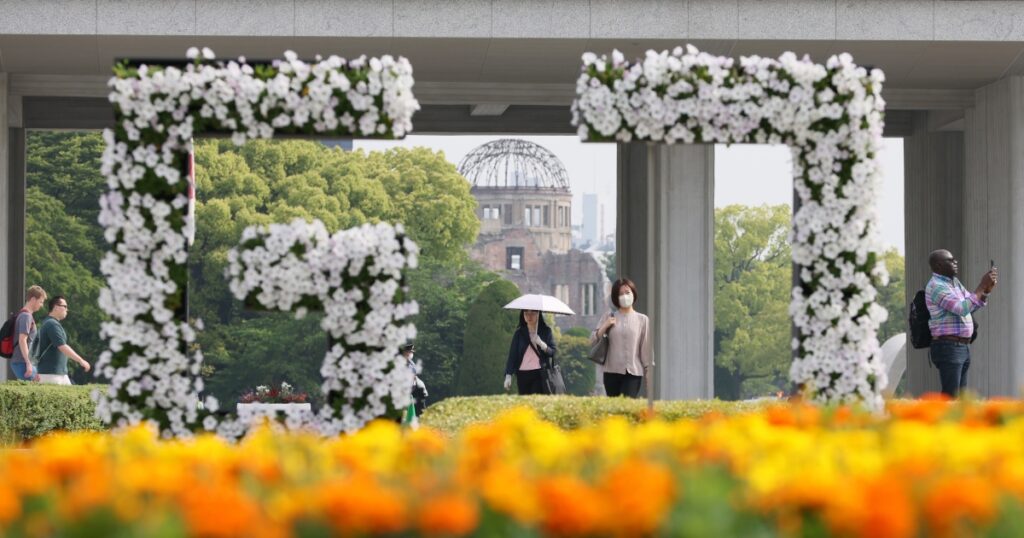Upfront of the Group of Seven (G-7) summit in Hiroshima, Japan on Could 19-21, 2023, Overseas Coverage at Brookings invited students to weigh in on the discussion board, the challenges it faces, and the way it may be profitable. Learn their responses under:
Pavel Okay. BaevNonresident Senior Fellow, Heart on the US and Europe
The re-energized West is a comparatively new phenomenon within the worldwide area, and plenty of stakeholders, notably within the International South, have doubts about its longevity. This exceptional unity has emerged as a response to Russia’s aggression in opposition to Ukraine in February 2022, and a serious activity of the G-7 summit in Hiroshima is to maintain this drive. The almost 15-month-long conflict is in a precarious section. The impasse that has lasted for a half-year may flip right into a sequence of Ukrainian advances, similtaneously the leaders of the Western coalition and invited friends interact in deliberations on consolidating their success. As Russia reels from a sequence of latest battlefield defeats, the now acquainted activity of increasing the sanctions regime would possibly grow to be much less demanding, aside from plugging the inevitable holes within the a number of restrictions on commerce and funding. This flip within the tide of conflict will, nonetheless, convey new dangers formed by capricious somewhat than calculated (and presumably even determined) strikes by the Kremlin. So, the G-7 wants to contemplate the preemption of those dangers and never simply resilience.
The assembly in Hiroshima additionally includes the duty of demonstrating that Western solidarity shouldn’t be narrowly targeted on serving to Ukraine to win the conflict, however has a wider agenda of stabilizing the world order. Resisting China’s propensity for coercion is a really completely different proposition from defeating Russia’s aggression, and requires a special high quality of solidarity and a longer-term technique. Beijing is significantly better than Moscow at participating with and corrupting varied worldwide establishments. Decided efforts to advertise good governance and anti-corruption may grant the West a helpful political edge.
 Jessica Brandt (@jessbrandt)Coverage Director, Synthetic Intelligence and Rising Expertise Initiative and Fellow, Heart for Safety, Technique, and Expertise
Jessica Brandt (@jessbrandt)Coverage Director, Synthetic Intelligence and Rising Expertise Initiative and Fellow, Heart for Safety, Technique, and Expertise
When G-7 leaders collect in Hiroshima this week, countering financial coercion can be on the prime of their agenda. That could be a good factor, provided that it’s an more and more widespread instrument of authoritarian interference, and one that can’t be successfully deterred absent coordination amongst like-minded companions. How far member international locations will go towards saying tangible countermeasures stays to be seen — every of them relies on provide chains which are deeply built-in with China. However the truth that member governments are anticipated to launch a joint effort, even when solely an announcement of intent, indicators a rising consciousness of the stakes. By pressuring governments to prioritize Beijing’s pursuits over these of their very own residents (or punishing them for doing in any other case), and by stifling expression that’s important of Beijing, coercive financial techniques undermine democratic deliberation inside open societies, and in the end erode the broader rules-based worldwide order.
 Daniel S. Hamilton (@DanSHamilton)Nonresident Senior Fellow, Heart on the US and Europe
Daniel S. Hamilton (@DanSHamilton)Nonresident Senior Fellow, Heart on the US and Europe
At their finest, G-7 summits can carry out an necessary agenda-setting operate by prioritizing key challenges and mobilizing sources to sort out them. But leaders typically succumb to the temptation to speak about all the things, and thus to prioritize nothing. They made 323 commitments on the 2022 Elmau summit and a whopping 429 commitments on the 2021 Cornwall summit. Little is completed to trace these commitments as soon as the household picture is taken and leaders jet away. Compliance varies significantly. Few pledges survive intact.
The important thing exams for the Hiroshima summit, due to this fact, are focus, dedication, and follow-through. Japan’s agenda consists of safety points, local weather change, and world well being. Safety leads. Prime Minister Fumio Kishida has been robust on help for Ukraine, forthright in regards to the rising strategic linkages between the North Atlantic and the Indo-Pacific, and has invited NATO to open an workplace in Japan. Leaders are more likely to unveil tighter sanctions in opposition to Moscow and measures to shut off loopholes. A brand new provide chain partnership may reduce dependence on Russia and China. Traditionally, nonetheless, G-7 efficiency on China has been weak. On local weather points, bold G-7 rhetoric is belied by ongoing variations over the power transition and intramural subsidy fights. The very actual alternative to construct a cleantech alliance nonetheless appears past their grasp. COVID-19 roused G-7 leaders to raised mobilize monetary sources behind world well being priorities, and G-7 well being ministers have introduced varied initiatives surveilling ailments, preventing antimicrobial resistance, and strengthening public well being care. Whether or not these may be sustained stays to be seen.
 Patricia M. Kim (@patricia_m_kim)David M. Rubenstein Fellow, John L. Thornton China Heart and Heart for East Asia Coverage Research
Patricia M. Kim (@patricia_m_kim)David M. Rubenstein Fellow, John L. Thornton China Heart and Heart for East Asia Coverage Research
When President Joe Biden arrives in Hiroshima this week, he’ll be the second sitting U.S. president to go to the Japanese metropolis that was devastated by a U.S. nuclear bomb in 1945. The primary was President Barack Obama, who memorably referred to as on the worldwide neighborhood from the Hiroshima Peace Memorial to see “rising interdependence as a trigger for peaceable cooperation and never violent competitors” and for the eventual elimination of nuclear weapons.
Solely seven years have handed since Obama’s go to, however the world appears to be in a significantly darker place right this moment. Interdependence is not seen as a power for peace and states throughout the globe are speeding to limit hyperlinks and improve self-reliance. Nice powers seem tired of limiting and in the end eliminating nuclear weapons. As an alternative, Moscow has suspended its participation within the New START Treaty and turned to nuclear saber-rattling because it faces setbacks in its unprovoked assault in opposition to Ukraine. Beijing is quickly increase its nuclear arsenal because it prepares for long-term competitors with the US. In the meantime, efforts to cease Pyongyang and Tehran from advancing their nuclear applications have misplaced all momentum and nobody appears to have recent concepts or the bandwidth to reinvigorate diplomacy.
The G-7 may have its arms full in addressing speedy crises just like the conflict in Ukraine. The summit additionally presents a chance for main states to map out a long-term imaginative and prescient for a extra hopeful future — one that’s centered on a rules-based order that capabilities fairly effectively regardless of the presence of states which have elementary variations and longstanding conflicts. This may require efforts, amongst others, to make sure “narrowly focused” de-risking really stays narrowly focused and doesn’t cease simultaneous efforts to forge an open, honest, and resilient world financial order that realistically should embody pals and adversaries alike. It’ll additionally necessitate going through seemingly intractable challenges head on, like arms management and nuclear proliferation, which are presently on the backburner however quickly boiling over and should quickly result in disastrous penalties.
 Adam P. Liff (@AdamPLiff)Nonresident Senior Fellow, Heart for East Asia Coverage Research
Adam P. Liff (@AdamPLiff)Nonresident Senior Fellow, Heart for East Asia Coverage Research
The 2023 G-7 summit in Hiroshima presents a superb alternative for (host) Japanese Prime Minister Fumio Kishida and U.S. President Joe Biden to focus consideration on a set of associated Indo-Pacific problems with explicit concern to Tokyo and Washington, and with world significance: deepening frictions throughout the Taiwan Strait; the varied levers Beijing employs to intimidate and isolate democratic Taiwan internationally; and the potential dangers for G-7 members, invited visitor international locations, and the broader world if present traits proceed (or speed up). One concern largely neglected to this point: subsequent week’s assembly would be the final G-7 summit earlier than Taiwan’s January 2024 presidential election. As a result of incumbent President Tsai Ing-wen (2016-) is term-limited, one inevitability earlier than subsequent yr’s G-7 assembly is new management in Taipei.
Given historic precedents and Beijing’s more and more laborious line throughout Tsai’s two phrases, particularly over the previous yr, a major enhance within the Folks’s Republic of China’s coercion, disinformation, and different destabilizing actions within the run-up to and/or instantly following Taiwan’s democratic election shouldn’t be tough to think about. Although this concern was not addressed instantly, final month’s G-7 international ministers’ assertion referred not solely to “peace and stability throughout the Taiwan Strait” but in addition expressed “help [for] Taiwan’s significant participation in worldwide organizations.” Although the 2021 and 2022 G-7 summit statements importantly did “underscore the significance of peace and stability throughout the Taiwan Strait and encourage the peaceable decision of cross-Strait points,” neither talked about Taiwan itself. Will G-7 leaders ship an unambiguous message not solely about “the significance of peace and stability,” but in addition about respect for Taiwan’s democratic course of and the correct of the folks in Taiwan to meaningfully take part within the worldwide neighborhood?
 Natalie Sambhi (@SecurityScholar)Nonresident Fellow, Heart for East Asia Coverage Research
Natalie Sambhi (@SecurityScholar)Nonresident Fellow, Heart for East Asia Coverage Research
The inclusion of Australia, South Korea, India, Indonesia, Brazil, Vietnam, Comoros, and the Cook dinner Islands at this yr’s G-7 reveals Japan is utilizing its management to usher in Indo-Pacific companions and Asian voices. India and Indonesia’s invites are linked to their respective roles as chairs of the G-20 and the Affiliation of Southeast Asian Nations, whereas Australia’s was the product of nearer safety ties. As Tokyo sees it, main safety and financial points ought to embody the say of rising economies like Brazil and smaller states, notably these disproportionately impacted by local weather change, like Comoros and the Cook dinner Islands.
This raises the perennial query in regards to the membership of present worldwide establishments, which displays a constellation of Twentieth-century powers. The 2023 G-7 visitor record represents a extra life like distribution of worldwide energy and affect which has irrevocably drifted from the Euro-Atlantic area to the Indo-Pacific. That issues as a result of, if the joint assertion is to hold any weight, finest that it represents the need of the worldwide neighborhood, not the intent of some. In mild of the April G-7 international ministers’ communiqué, we will anticipate robust phrases about Russia’s aggression in Ukraine and China’s financial coercion. The inclusion of voices from Indonesia, Brazil, India, South Korea, and Vietnam would assist mitigate the notion of Westernized liberal democratic states ganging up on Moscow and Beijing and bolster calls to foster peace and stability for all.
 DAVID G. VICTORNonresident Senior Fellow, Vitality Safety and Local weather Initiative
DAVID G. VICTORNonresident Senior Fellow, Vitality Safety and Local weather Initiative
What is going to the G-7 do about local weather change? The reply, this yr, appears to be: not a lot. There’s nothing like a land conflict in Europe, ongoing jitters in power markets, and world macroeconomic stress to focus minds on different subjects. Anticipate the same old well-intentioned phrases about overdue motion on local weather change however no main breakthroughs. Most of what may be mentioned by the G-7 in all probability already was mentioned earlier this yr — at an April assembly on local weather and power which marked modest progress, corresponding to pledges for getting and deploying extra photo voltaic and wind energy, which G-7 members had been already doing.
However the G-7 must grow to be much more lively. When the U.S. Inflation Discount Act handed final August, buyers, nearly instantly, began eyeing the U.S. market. Huge offers have been introduced and the funding knowledge reveals a giant shift into the US already. Extra will comply with. Different governments have responded with their very own (much less beneficiant) applications. Dangers are mounting as every nation tries to draw buyers and as the US, particularly, tries to shift provide chains onshore.
Just some years in the past the chief drawback was erratic spending on local weather change; now the issue is likely to be spending an excessive amount of in ways in which put stress on Western alliances and on open buying and selling guidelines that can assist guarantee clear power know-how reaches a world market. The G-7 might be a venue to broaden offers already within the works, corresponding to between the US and Japan, to push a clear power revolution that engages all the massive economies.




